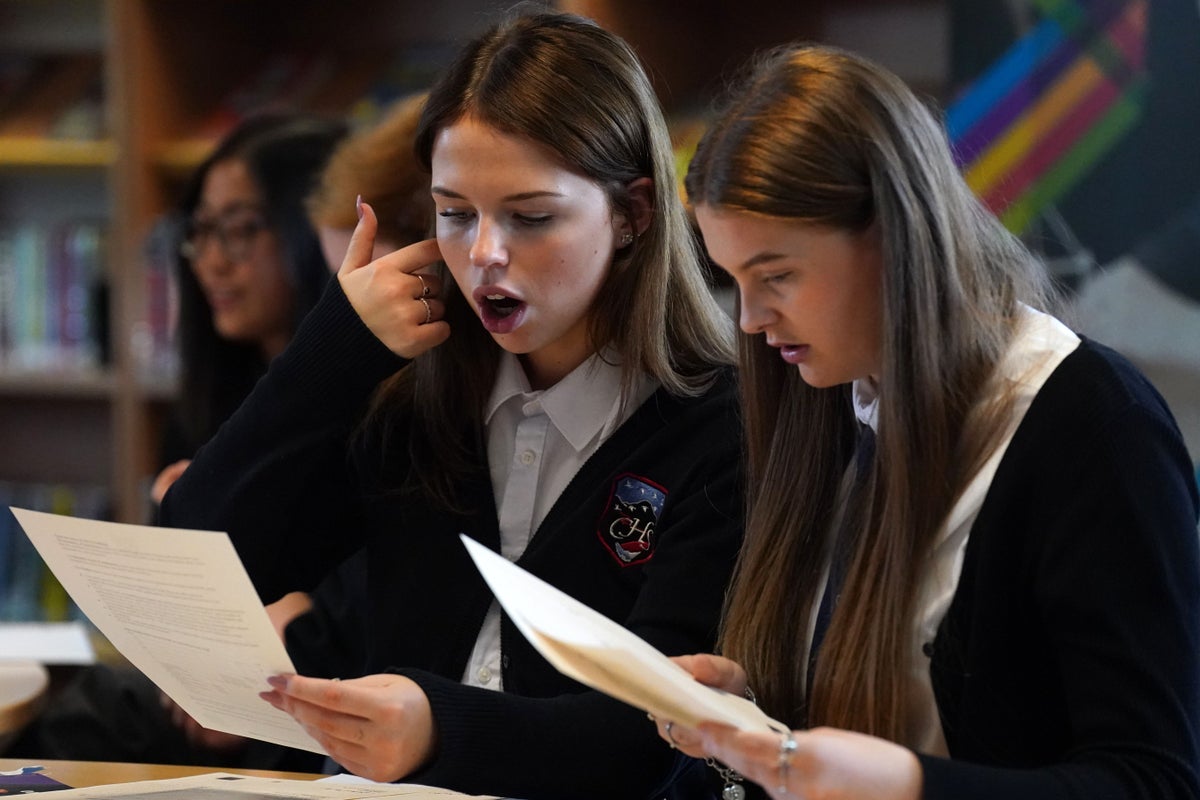
A-level students need to be “quick off the mark” on results day to secure their university places as clearing faces more competition, the head of Ucas has warned.
Clearing is available to students who do not meet the conditions of their offer on A-level results day, as well as those who did not receive any offers.
Students who have changed their minds about what or where they wish to study can also use clearing.
Clare Marchant, chief executive of Ucas, advised students to have a sturdy plan B ahead of results day to avoid disappointment.
“It’s getting more competitive which means places are filled up quicker and therefore there are slightly less in clearing and the competitive stuff that is in clearing is likely to go faster,” she said.
The increased competition is due to a rise in the population of 18-year-olds, she said, as well as the influx of international students who are also vying for places in the UK’s top institutions.
Some top universities had just a handful of courses available through clearing – which matches applicants to university places yet to be filled – in the week before A-level results day, while others have no vacancies listed.
A PA news agency sample of 130 of the UK’s largest higher education providers showed more than 22,000 courses with vacancies for undergraduate students living in England were available on the Ucas clearing site as of Wednesday.
Fifteen of the 24 elite Russell Group universities had vacancies on courses for English residents – a total of 2,021 courses between them.
A similar analysis last year, in the week before A-level results day, showed 17 of the 24 Russell Group universities had vacancies on courses for English residents – a total of 2,358 courses between them – on the clearing site.
The head of Ucas has warned A Level students to have a Plan B on results day as clearing becomes more competitive— (PA)
University College London (UCL) does not currently have any vacancies in clearing “due to high demand for places”, but it is being kept “under review”.
A UCL spokesman said: “Should vacancies become available they will be advertised from 8am on August 17.”
The University of Manchester, which currently has no courses on Ucas’ clearing site, said it has not yet determined whether it will offer clearing vacancies to students this year.
A spokesman for the university said: “If we do go into clearing, it is likely to be for a limited number of places on a small number of programmes.”
Some universities had only a few courses listed on Ucas’ clearing site, with just two at the University of Exeter and four at St George’s, University of London.
Ms Marchant said: “When it comes to results day on August 17, I think a lot of those highly selective courses at highly selective institutions will go quite quickly.
“So certainly my advice to students, our advice at Ucas, is to be pretty quick off the mark if that’s what you’re looking for.”
University College London (UCL) does not currently have any vacancies in clearing ‘due to high demand for places’— (Getty Images)
Eight days ahead of exam results day, there were a total of 22,410 courses through clearing across 130 universities, the PA analysis showed.
A similar analysis by PA last year – carried out six days before A-level results day – showed there were a total of 23,280 courses through clearing.
The University of Liverpool, which currently has no courses listed on Ucas’ clearing site, said it expects to offer vacancies to a “small number of high-quality candidates” in clearing.
But the university spokesman added: “We are unable to be more specific at this stage until results day when we will know exactly which courses might have spaces available.”
The Covid effect
In England, this year’s national A-level results will be lower than last year but they are expected to be similar to those before the pandemic.
It comes after Covid-19 led to an increase in top A-level grades in 2020 and 2021, with results based on teacher assessments instead of exams.
The cohort of students who are currently awaiting their A-level results did not take GCSE exams and were awarded results determined by their teachers.
A-level and T-level results are out on August 17, while GCSE results will be released on August 24— (PA Archive)
Ms Marchant said there might be a “slight increase” in appeals from students this year who may have expected to secure higher grades but she did not believe it would be significant.
She added that Ucas has increased the amount of social media support offered to students ahead of results day in a bid to “manage expectations”.
“A lot of people I talk to, it feels like Covid-19 was a long, long time ago. This is still the tail of Covid really because these students haven’t sat external exams before and I think that we need to be very cognisant of that in sort of making sure we have really good support,” Ms Marchant said.
Earlier this week, a social mobility expert suggested that students waiting for their A-level results are “the unluckiest” to come out of the pandemic as they face fewer top grades despite disruption to schooling.
Lee Elliot Major, professor of social mobility at the University of Exeter, said this year’s A-level cohort need support and guidance as they will be experiencing “the highest levels of anxiety and uncertainty”.
A spokesman for the Russell Group said: “The confirmation from Ofqual that grade distributions will return to 2019 levels has given universities more confidence in making offers compared to last year, which may mean universities have less flexibility to offer courses in clearing in some subjects.
“However, most Russell Group universities have courses available in clearing this year, across a range of subjects, as they have done in past years and more courses will become available after results day.”







